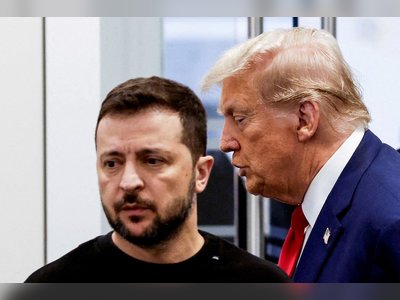White HouseSenateThe HouseSupreme CourtFederal ReserveDOJState DepartmentTreasuryCensusBudget OfficeTrade Representative
WashingTone
Informed by Washington, Defined by Insight
Tuesday, Apr 08, 2025
WashingTone
The Trump Administration Cancels Legal Status for More than 530,000 Migrants from Four Nations
The temporary protections for migrants hailing from Cuba, Haiti, Nicaragua, and Venezuela will terminate on April 24, 2025.
The Trump administration has revealed plans to revoke the temporary legal status of roughly 530,000 migrants from Cuba, Haiti, Nicaragua, and Venezuela.
Detailed in a notice from the Department of Homeland Security (DHS), this decision will end the two-year humanitarian parole provided by the previous administration, effective April 24, 2025. The migrants in question entered the U.S. through the Cuba, Haiti, Nicaragua, and Venezuela (CHNV) humanitarian parole program, which commenced in October 2022. This initiative permitted individuals from these nations to live and work in the U.S. for up to two years, contingent on having American sponsors.
DHS notes that the CHNV program was originally designed to strengthen border security and decrease illegal immigration by offering lawful entry routes.
However, the current administration has determined that the circumstances justifying such parole no longer exist.
As a result, migrants lacking a legal right to stay in the United States must leave by the April 24 deadline.
Failure to comply could lead to removal proceedings.
The CHNV program allowed over 530,000 people to enter: about 213,000 Haitians, 120,700 Venezuelans, 110,900 Cubans, and 93,000 Nicaraguans.
In addition to discontinuing the CHNV program, the administration is also contemplating revoking the temporary legal status of around 240,000 Ukrainians who sought asylum in the U.S. amid the ongoing conflict with Russia.
DHS has suggested that some individuals currently enrolled in the CHNV program might be allowed to stay in the U.S. on a case-by-case basis.
However, those without a legal basis to remain are urged to leave before their parole expires to avoid enforcement actions.
This shift in policy signifies a major change in U.S. immigration strategy, affecting hundreds of thousands of migrants who have built lives in the country through the humanitarian initiatives of the previous administration.
Detailed in a notice from the Department of Homeland Security (DHS), this decision will end the two-year humanitarian parole provided by the previous administration, effective April 24, 2025. The migrants in question entered the U.S. through the Cuba, Haiti, Nicaragua, and Venezuela (CHNV) humanitarian parole program, which commenced in October 2022. This initiative permitted individuals from these nations to live and work in the U.S. for up to two years, contingent on having American sponsors.
DHS notes that the CHNV program was originally designed to strengthen border security and decrease illegal immigration by offering lawful entry routes.
However, the current administration has determined that the circumstances justifying such parole no longer exist.
As a result, migrants lacking a legal right to stay in the United States must leave by the April 24 deadline.
Failure to comply could lead to removal proceedings.
The CHNV program allowed over 530,000 people to enter: about 213,000 Haitians, 120,700 Venezuelans, 110,900 Cubans, and 93,000 Nicaraguans.
In addition to discontinuing the CHNV program, the administration is also contemplating revoking the temporary legal status of around 240,000 Ukrainians who sought asylum in the U.S. amid the ongoing conflict with Russia.
DHS has suggested that some individuals currently enrolled in the CHNV program might be allowed to stay in the U.S. on a case-by-case basis.
However, those without a legal basis to remain are urged to leave before their parole expires to avoid enforcement actions.
This shift in policy signifies a major change in U.S. immigration strategy, affecting hundreds of thousands of migrants who have built lives in the country through the humanitarian initiatives of the previous administration.










